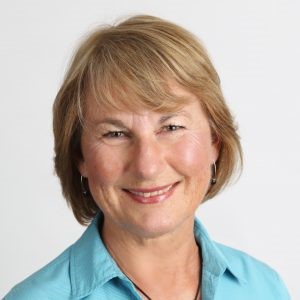 After 24 years as an accomplished neuropsychology professor, clinician, and researcher, New Zealander Jenni Ogden is living off-grid on the Great Barrier Island, off the northeast coast of New Zealand, and finally making good on her dream to publish her first novel.
After 24 years as an accomplished neuropsychology professor, clinician, and researcher, New Zealander Jenni Ogden is living off-grid on the Great Barrier Island, off the northeast coast of New Zealand, and finally making good on her dream to publish her first novel.
Tell us a little about your background…
I grew up in a country town on the South Island of New Zealand, in a home bursting with books and music. I had one sister four years older than me, and the best parents. As a child, I had rheumatism and spent about three or four months bedridden every year in the winter from the age of 8 to 13. I quite enjoyed it in a way and became an avid reader, being assessed as having a reading age of 18 when I was nine! My mother was diagnosed with breast cancer when I was 12 and died five years later. Looking back, that was a tough five years.
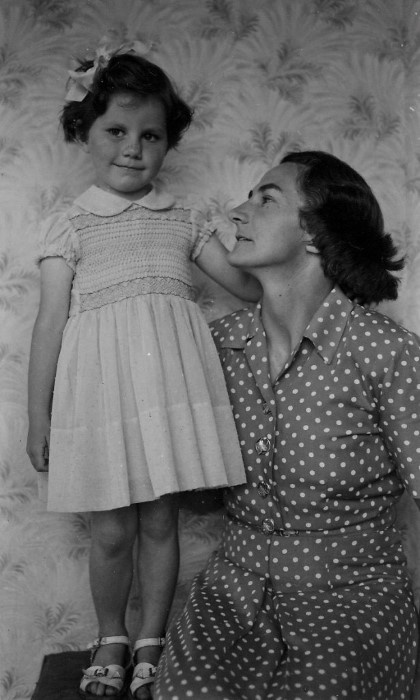
With my mother, 1951
As a kid, I wanted to be a vet, but when I did the first year of veterinary science at University, I didn’t reach the grades required in Physics and Chemistry and had to repeat them (and decided I’d take university more seriously from then on), so to fill in time I took some psychology courses. These were so much easier and I really enjoyed them so I decided to ditch Veterinary Science and instead graduated with a Bachelor of Science, majoring in animal behavior and psychology.
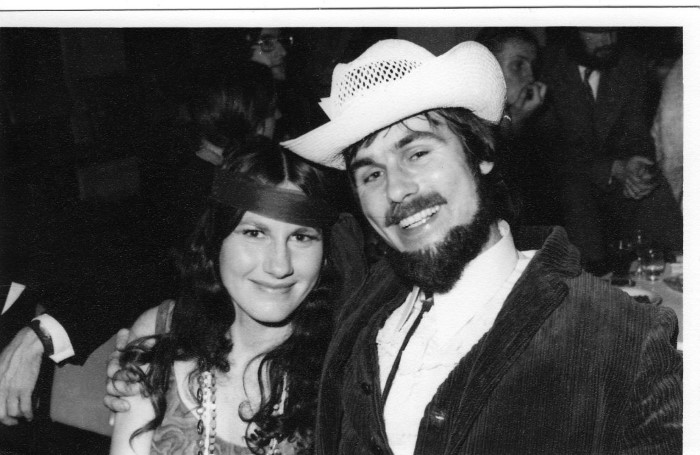
With John, 1972
Love came along and around my 23rd birthday; I moved in with an ecology lecturer I had met as a student and took on his two children, aged 11 months and almost 3 years. Because the children were so young, they quickly adapted to me as their mother. We moved to Canberra, Australia, and got married a few months before our daughter was born. Three years later, we adopted a baby from Sri Lanka. I went over there for three weeks and adopted him while my husband stayed in Australia with our other three children. It was just before the civil war and Sri Lanka was very unstable, and quite an experience. Our new son was about 12 months old at his adoption, had had all sorts of tropical diseases, and was malnourished; for six weeks, I had to carry him, sleep with him and never leave his side. But within six months he was healthy, happy, and able to go to playschool with his sister.
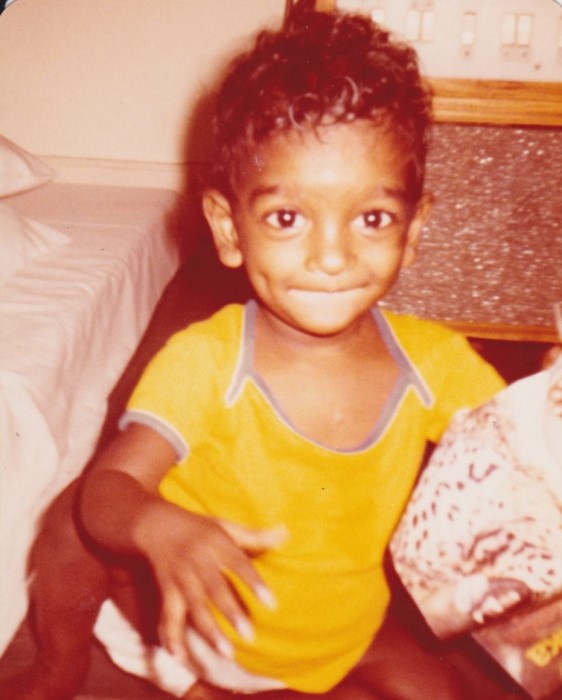
Our son Joachim, the day after his adoption, Sri Lanka, 1977
While living in Australia, we went on lots of camping trips and spent summers on the Great Barrier Reef where I worked as a volunteer turtle tagger. I did a postgrad university diploma in social sciences by correspondence and, when we returned to Auckland, New Zealand—our youngest was two and our eldest ten—I enrolled at Auckland University part-time for my Masters in Psychology. I loved being a student again and followed that with a three-year postgraduate Diploma in Clinical Psychology, followed by a PhD in Clinical Neuropsychology and a postdoctoral fellowship at Auckland Hospital.
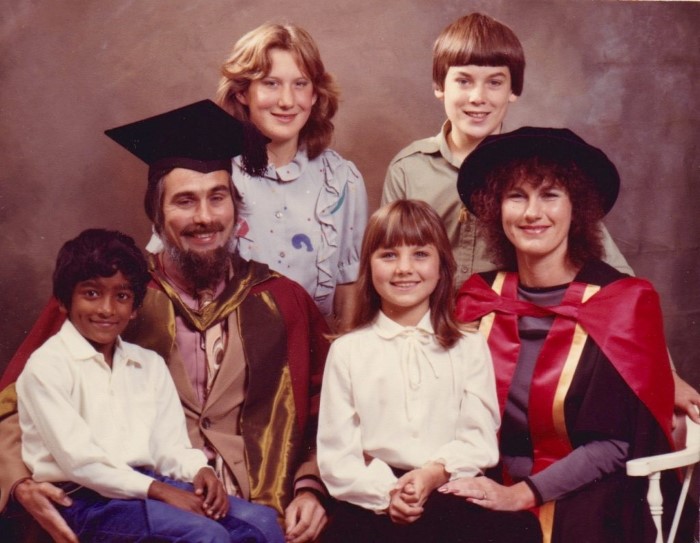
My PhD graduation, with John and our children, 1984
In 1985, when I was 37, we spent a year in the US; my husband had a research fellowship at Harvard and I had a postdoctoral fellowship at Massachusetts Institute of Technology. I was in the right place at the right time and was privileged to work with H.M., the most famous amnesiac in history. (Read my Psychology Today post on HM.)
We returned to Auckland, where I became the Director of the Postgrad Clinical Psychology program at Auckland University, only three years after graduating from that same program! It was a very steep learning curve, and very stressful, especially as I wanted to continue with my research, had a substantial lecturing load, and also worked as a clinician and supervised students in our psychology clinic. And then there were our four school-age children!
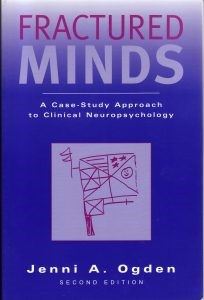
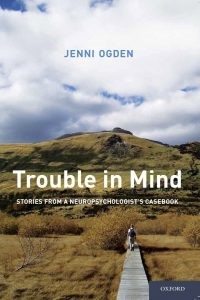
For the next 24 years, I immersed myself in my job and wrote 60 chapters and peer reviewed articles for academic journals, and two books, Fractured Minds: A Case-Study Approach to Clinical Neuropsychology and Trouble in Mind: Stories from a Neuropsychologist’s Casebook
. Fractured Minds, first published in 1996 by OUP, New York, with a 2nd edition in 2005, is still a good seller after 20 years, and delivers me a worthwhile royalty check every year. In 2015, I was honored with the Distinguished Career Award by the International Neuropsychological Society.
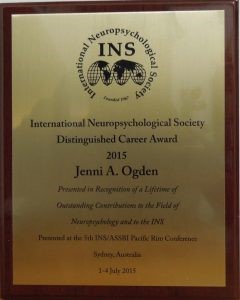
We have been extraordinarily lucky with our children who are all very independent and active; they love the great outdoors, are warm and intelligent, share our left–leaning values, and have a great sense of humor. The two middle ones have provided us with five grandchildren, ages 4 to 13.
When did you start to think about making a change?
I loved my career as a university teacher, researcher, and supervisor of clinical psychology students, and a big part of this was always writing. Of course, it was nonfiction writing, from research articles to writing case studies of dysfunctional families for my clinical students to use as practice scenarios.
Although I wrote research papers on large group studies, my greatest passion was for single case studies. My specialist area, clinical neuropsychology, gave me the excuse to delve into the lives of patients with various brain disorders (similar to those Oliver Sacks wrote about), discover new things about their disorder, and hopefully find new ways to assess and rehabilitate people with similar problems, and also to find out more about how the mind works.
I discovered some unique cases and wrote them up in top journals. Although these articles were scientific they were also very easy to read, as basically, they were stories about very courageous people. That’s when I decided to write my textbook Fractured Minds. Way back then, I nursed a fantasy that one day I would write a novel, and in the acknowledgments of that first edition of Fractured Minds in 1996, I thanked my editor who took a punt on a new author who wanted to write a novel disguised as a textbook!
At that point, I was in my late forties, and in truth had no time to write fiction even though I daydreamed about it. I had been an avid fiction reader since childhood but usually only managed to read novels in bed at night before falling asleep. The university was becoming more and more business-oriented and as I rose higher in the academic system, so did my administration tasks. By then, we had purchased our holiday home on Great Barrier Island (now our permanent home) and I was dreaming up ways we could live there full time and I could write fiction.
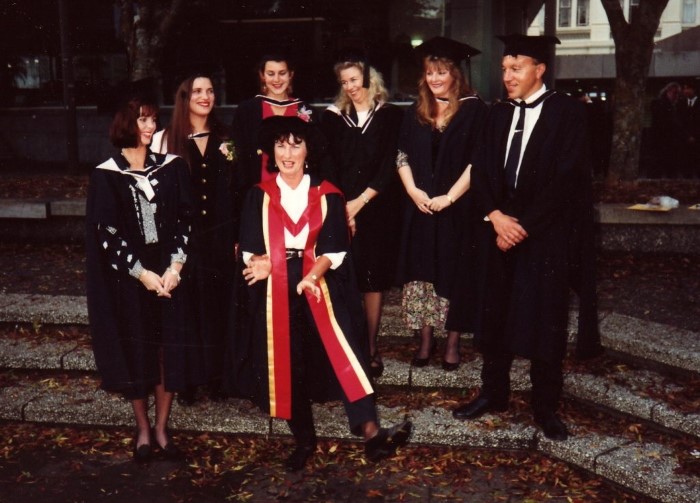
With my graduating clinical psychology students, 1999
My husband, who was also a university professor, was six years older than me so we figured that we could retire on my 60th birthday, sell our house in Auckland, and go live on the island so I could write and John could continue with his own writing and conservation work. But this seemed a long way off so we came up with a proposal to go part-time and live on our island for six months of the year (the summer half!) and work full time at the university the other half.
It took a lot of talking and meetings and telling the university we would resign if they didn’t agree before we finally had our new part-time contracts. We went part-time when I was in my mid-fifties, with an agreement that we would retire fully on my 60th birthday. It was a wonderful move and we’ve never regretted it. Starting off part-time gave us a chance to practice being together all day, every day, on a remote island, and it worked most of the time. It helps that John has his study upstairs and I have mine downstairs!
We wanted to enjoy living in such an idyllic place while we still had our good health and for both of us, simply living by the ocean gave us joy and enormous pleasure. We also planned on many more years to indulge new passions (for me, taking my fiction writing seriously) and continue to enjoy old ones (travel especially). We weren’t sure how long our money would last for luxuries like travel, but we thought we could manage with careful budgeting and smart travel planning.
On the island, many folks live by the motto “We work to live” and not “We live to work,” and the fact that the island is home to a vibrant population of a very fit and healthy community- and conservation-oriented independent people over 65 (many of whom are eccentric) was a good sign. It had always seemed to me that many people work long stressful days for most of the year in order to be able to afford two weeks’ annual holiday on an island like ours. How much better to wake up here every day!
What is your next act?
My next act has three strands: Living off-grid, writing novels and traveling.
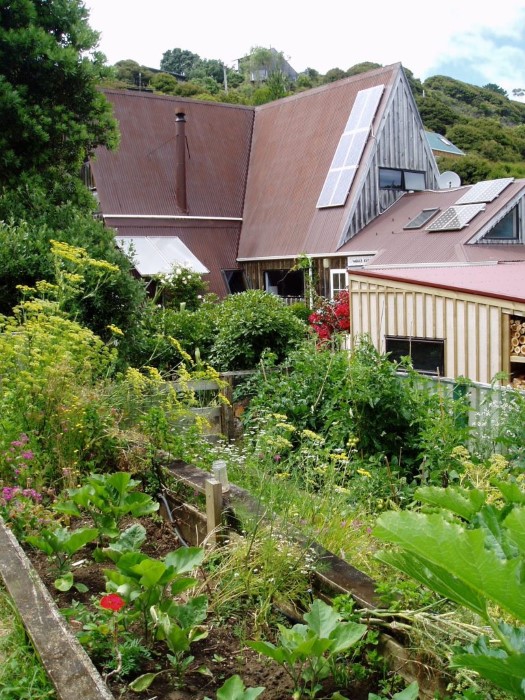
Our home on Great Barrier Island
Tell us about living off grid.
Great Barrier Island is off-grid except for telephone service (where we live there is no cell phone coverage). We do have a satellite Internet connection. We fell in love with everything about the island the first time we came here on a camping holiday about 30 years ago. It is a magical place and helps us move a little closer to our aim to reduce our carbon footprint. The bay we live on has only a tiny population, a few summer houses, and almost no permanent residents other than us. The island itself is mountainous with stunning white-sand beaches and is 100km from the NZ mainland and Auckland, the biggest city and our home for 30 years. The regular boat takes five hours to get here but fortunately, there are two small airlines and the flight, in good weather, is only 35 minutes. The plane we fly in has six or eight passengers! We only go to Auckland for the writer’s festival, or briefly on our way to somewhere else.
Perfecting the art of living off-grid is an ongoing experiment but one with lots of participants, as our entire island is off-grid, with no services apart from the telephone, and our satellite internet connection, which makes an enormous difference to my writing ventures. Which solar system or water or sewage system is best is an ongoing conversation amongst the 800 inhabitants.
Picking our salad and vegetables out of the garden two minutes before it is time to prepare dinner, wandering our mostly deserted beach, swimming every day in summer, and eating the fish my husband catches from his kayak (and fillets and cooks—he is a great cook)—well why wouldn’t we want to live here? (See my Psychology Today post on off-grid living.)
In our winters (late May to mid-October), we escape to Australia and spend three or more months in a small apartment we own in Tropical Far North Queensland (gateway to the Great Barrier Reef). It is in the holiday rental pool when we are not there. The average daytime high in mid-winter is 28 degrees Celsius (82 Fahrenheit).
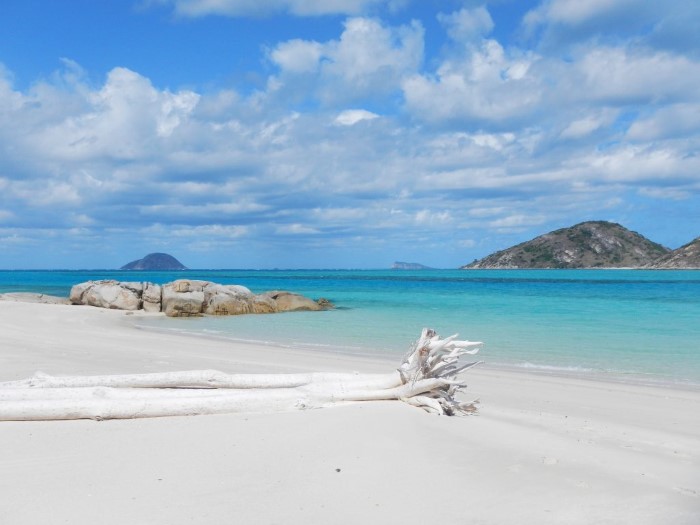
Where we camped, Lizard Island on Great Barrier Reef, Australia, 2012
While there, we take camping trips, usually to wild places that require 4WD and river crossings with crocodiles lurking. My husband John is an ecologist and bird fanatic so seeking out rare birds takes us to many remote locations. Every two or three years, we also travel to UK/Europe/Africa/US depending on our mood and finances (I am a master at planning cheap travel). I often plan parts of our travel around writers’ festivals (where I sometimes speak), writers’ workshops and masterclasses, music festivals (blues, jazz, and folk are my loves, although I also enjoy classical music), and wine and food festivals. We are fortunate that we get to travel in the NZ winter (that carbon footprint shamefully increasing in size as we fly across the world), but the best road is always the road home.
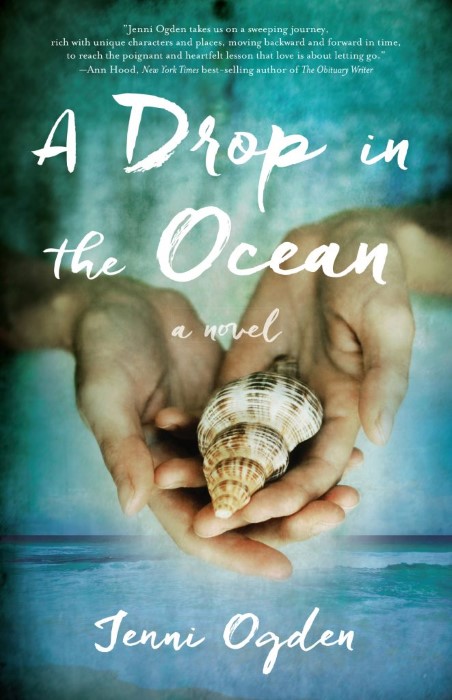
What is your first published novel about?
A Drop in the Ocean, just published by She Writes Press, will, I suspect, always be the novel that contains the most autobiographical material. The protagonist, Anna, is a Boston neuroscientist—although she is almost the reverse of me personality-wise—and the main part of the book is set on Turtle Island on Australia’s Great Barrier Reef, which is modeled on Heron Island, where we spent many summers long ago.
Anna becomes involved in turtle tagging research and many of her tagging and snorkeling experiences are closely based on my own experiences as a turtle researcher in my younger days (including coming face-to-face with a giant Queensland Grouper!). Near the end of the book, Anna goes to Unst, the northern-most island of the remote Shetlands in the UK. Just before I started writing the novel, we spent some time there, and the descriptions of Shetland, the croft Anna stays in, and the trip to the gannet colony are based closely on this.
The story champions marine turtle conservation and also touches upon the tragic genetic disorder of Huntington’s disease. I include the author’s notes on both these topics at the end of the book, as well as suggested topics for reader group discussion.
And I’m proud to report that A Drop in the Ocean just won a Gold prize in the US Independent Publisher Book Awards for Best Regional Fiction–Australia/New Zealand.
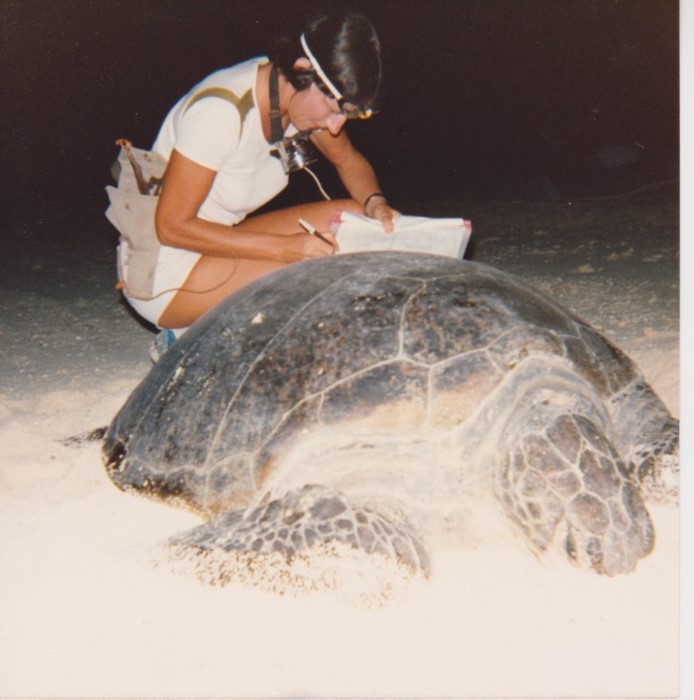
Turtle tagging on Heron Island, Australia, 1978
You wrote a previous novel that hasn’t yet been published. How did you finally begin that process?
I wasn’t one of those writers who had been penning stories since babyhood (see my post “Apprenticeship” on She Writes). I knew it would be hard of course, but I also knew it would be challenging and fulfilling. It is one of my purest pleasures to spend time finding the perfect word, sentence, and paragraph to express what I am imagining in my head (and heart).
I began my first, as yet unpublished, novel (currently titled That Old Sweet Song) when we went part-time from the university. I had no clue really what I was doing, and I spent more time planning intricate parallel plotlines and making complex genealogical charts of my numerous characters instead of just writing. In the half-year we were back full-time at the university, the novel fell into a deep hole and had to be resurrected again six months later. So I was determined that when that 60th birthday rolled around in 2008 I would go cold turkey from university stuff and concentrate solely on my new novelist career.
Living out of reach on our island, I did manage to divorce myself from the academic life, but then I got a request from my Oxford University Press (OUP) editor to write a third edition of Fractured Minds, which was still selling well. I declined, and instead decided to write a nonfiction case study book for the general reader—a memoir about my patients and what I learned from them— Trouble In Mind. OUP New York published it in 2012 and an Australian edition was published in 2013. But that took time and put my fiction writing firmly back into second place.
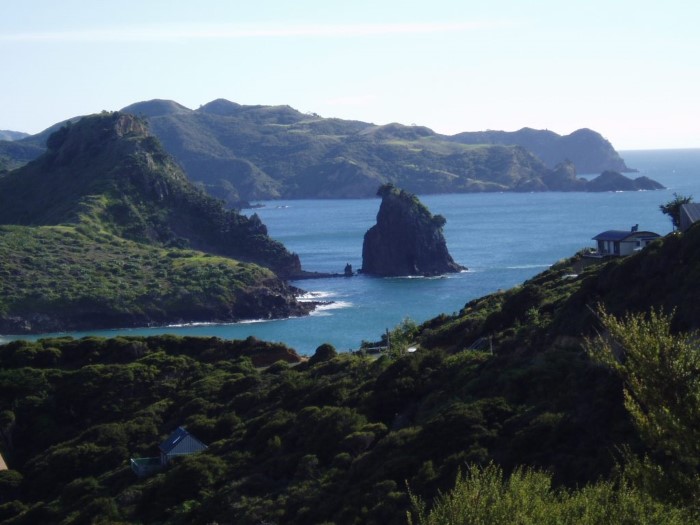
Our bay, Awana, on Great Barrier Island
I found it frustrating not being able to write the novel, but at least it motivated me to write Trouble In Mind very quickly! I was also asked to become an expert blogger for Psychology Today and I agreed to that, so that keeps me involved in psychology at a different level. Writers’ festivals began to request talks from me about my cases in Trouble in Mind as well, and that was exciting. (Here’s a video of my talk “Mind & Its Potential,” Sydney, October 2014). I have always loved writers’ festivals, mainly for the fiction, but I wasn’t about to turn down the opportunity to become a speaker even if it wasn’t (yet) on my fiction.
So it wasn’t until late 2010 that I had the time to really focus on my fiction writing. I blame my long career in the university for my failure to resist the temptation to keep on learning, sometimes to the detriment of my writing. Especially in the early fiction writing years, I spent lots of time joining webinars on writing, book publicity, and publishing options and querying agents.
Then there was all that social networking I discovered writers had to get involved in, and that was another enormous learning curve. But I liked it all (well, the social networking not so much) and loved the time when I was actually writing or revising the novel. The only hard part was banging away on the computer while the sun shone outside and the sea, a two-minute walk away, was warm and inviting! But so far I’ve never thought about giving up.
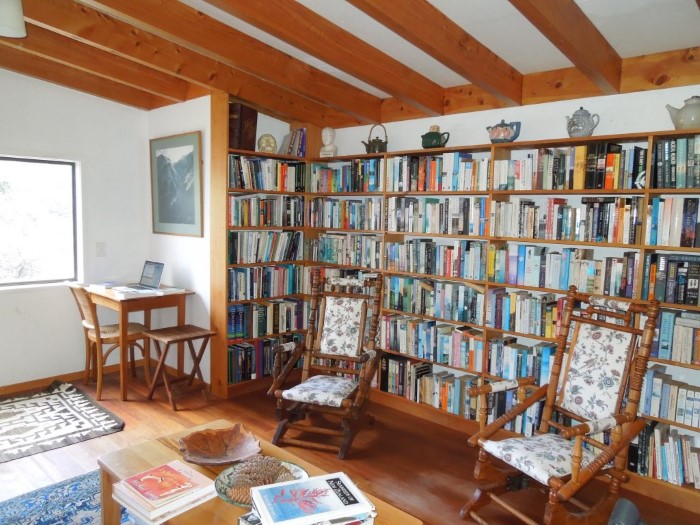
Our library in our Great Barrier Island house
What challenges have you encountered in writing fiction? What have you learned?
After I completed novel number one, I had to learn about being rejected. I didn’t find it too hard though; again, my university career had got me used to this and I took it all as part of the learning curve. Five years on, I’ve completed three novels, queried countless agents, and no longer spend more than two seconds’ regret when another rejection pings in. There is always some bright spot: an agent who wants to read the full manuscript and gives me positive feedback, even with a final rejection; winning mentorships with authors and creative writing teachers who critique my writing, and so on.
After many rejections of my first novel, an agent suggested a fantastic UK editor (now based in Los Angeles), Philippa Donovan of Smart Quill Editorial. I sent her my manuscript and was amazed by her insights. More revision, but I found I loved this part of the process. Later, I sent her the next two novels as well, and the second one (A Drop in the Ocean) she thought was so good that she submitted it to some select agents for me. But no takers—although a lot of praise. Finally, after exhausting research, I signed with US publisher, She Writes Press (SWP), to publish novel number two. SWP follows a traditional publishing process, which takes a year or more from accepting the manuscript to publication.
This has been an incredible experience and, apart from producing a beautiful novel that I am proud of, there have been many bonuses. I have learned an enormous amount about the publishing process; I now have a great group of SWP author friends, and I have discovered that the price of paying for the right publicist is priceless! (See my guest post on Writers Digest on this.)
I had no real idea how much work getting the book buzz out would be; for months before and after the book comes out, life becomes a round of social networking, writing articles and blog posts, in addition to the proofreading, cover design decisions, and all the other things that go into making a fine book.
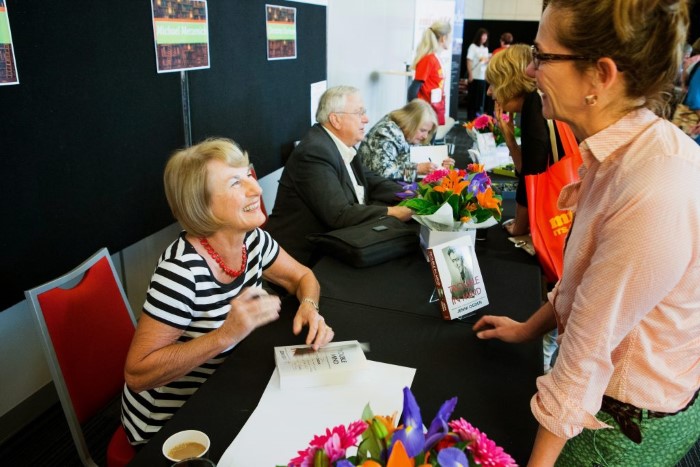
Book signing at Mind and Its Potential Conference, Sydney, 2014
Tell us about the other two novels you’ve been working on.
The first novel I wrote (That Old Sweet Song) has been revised many times. Following advice from agents and publishers that their upmarket women’s fiction readers like female protagonists, I gave my male protagonist a gender change: from a male to a female neurosurgeon. It bears little resemblance to my own experiences other than my knowledge of the life of a neurosurgeon in a general way (from my 30 years of research working with neurosurgeons). However, my psychologist background plays into the panic attacks that topple neurosurgeon Georgia from grace, and her therapy is hopefully reasonably realistic as a result of my years of experience as a therapist.
The locations are also familiar to me. It begins in London where I have spent a few holidays, and a major part of it takes place in New Orleans, which is one of my favorite places. However, the main event in the novel is Hurricane Katrina, and I wasn’t there during that—it almost feels as if I were thereafter the amount of research I did on it. I think that if on my death bed someone asks me what the most traumatic event in my life was, I might say Hurricane Katrina! The final major location for this story is Great Barrier Island where I now live.
My editor thinks my third novel, something of an experiment as it is Domestic Noir (psychological suspense), is my best yet, so we shall see. I’m apparently good at dramatic tension. It is set in the area of Far North Tropical Queensland where we spend our winters, and the protagonist is a clinical psychologist. There are many psychological issues in the story including sleepwalking and night terrors—about which I thankfully have no personal experience—but that I know about as a psychologist.
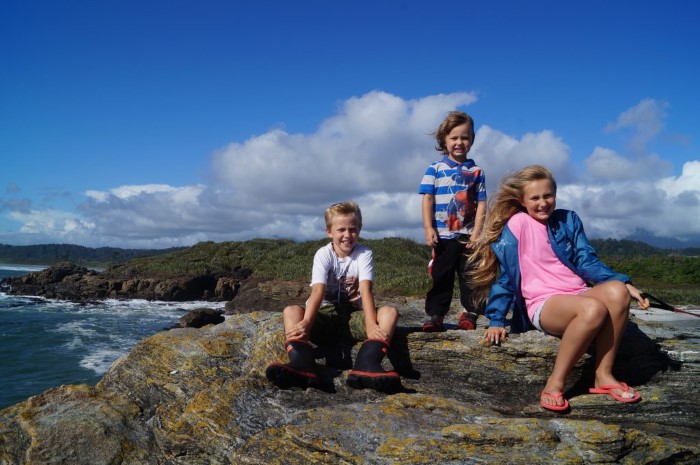
My grandchildren on West Coast, South Island, 2016
How supportive have your family and friends been?
Generally, my family is supportive, although as our children are all adults and live a long way from us, this is not really an issue. Our youngest son is one of my major supporters and hauls all his numerous friends onboard!
One of my daughters rolls her eyes and won’t push my book at her friends… (“You’re my mother for heaven’s sake. How embarrassing to ask my friends to buy it!” ) But she is supportive, just not publicly, and is herself an avid reader. The book club she belongs to is keen to be one of the first to read A Drop in the Ocean when it is out. Of course, she warns me that they will treat me just like any other author, and to expect honest critiques!
My husband John is a firm believer in me and my writing, and although he gets bored with all the details, he rarely has a problem with me spending enormous amounts of time on my writing, as well as considerable money.
My friends are all supportive even though they must secretly wonder if a novel is ever going to be published after all these years! My greatest source of writing, publishing, and emotional support comes from my many new author friends, most of whom are also SWP authors. It helps that we are all in this together, and we never get bored discussing this topic!
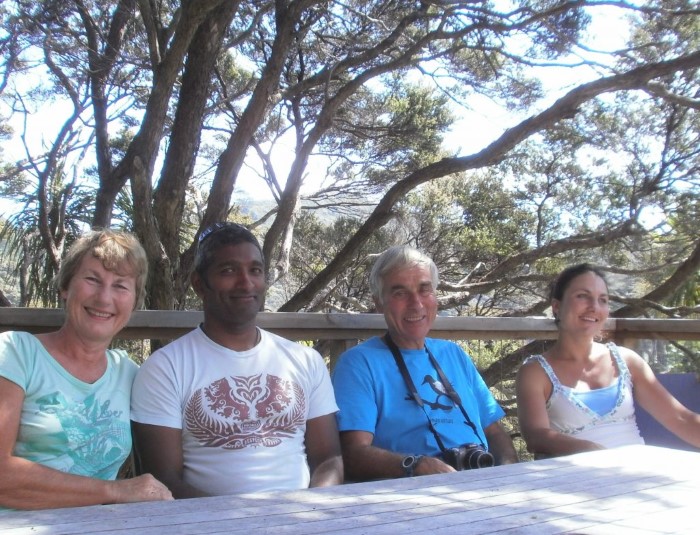
With Joachim, John, and Josie on our deck at Great Barrier Island
What advice do you have for fiction writers?
Write a story you are excited about. You’ll be living with it for a long time! Think of the early months and years as the learning phase—that saying that it takes 10,000 hours of practice to become an expert at a new skill applies to writing a novel. Working on your first novel is your degree in creative writing.
Read writing craft books and learn how to put yourself into your characters’ heads and feel what they are feeling. Then express it in words. If your character is feeling disgusted, imagine being forced to drink a glass of warm fat! (You get the idea…)
Find your voice. This is no easy task but, in my experience, it shows itself in that writing that tumbles out of you without too much conscious thinking. Often, for the reader who knows you well, their reading experience will be reminiscent of listening to you telling them the story after a good dinner. In other words, it truly does sound like your voice. Of course the actual writing will need revision, but if it flows and feels right, then try not to revise it so much that it loses its soul and freshness.
Remind yourself to be realistic and put glumness aside as the rejections trickle or pour in. They are telling you that the competition is fierce, perhaps that your book is not commercial enough (but ignore that if this is the story you want to write), and that you need to keep revising and getting better. Stamina and a belief that you can do it are so important!
Take the time to go to Writer’s Festivals and workshops, and join webinars that might have something useful to tell you. Many are free or not too costly. (If you get a chance to participate in a Donald Maass workshop, take it!)
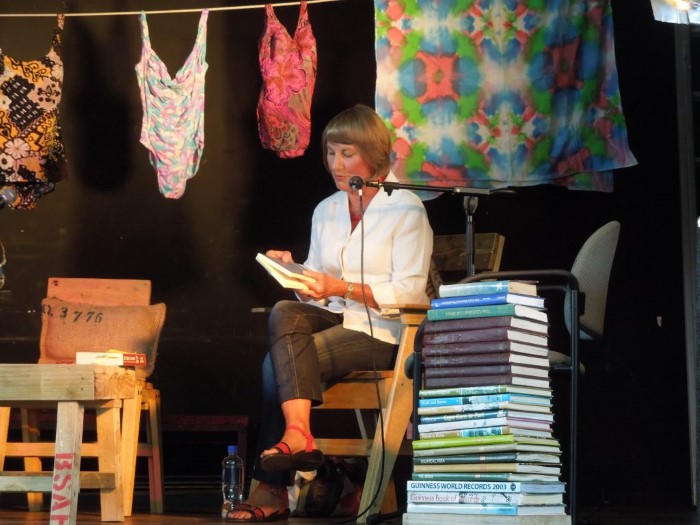
At Waiheke Writers Festival, New Zealand, 2015
Read, read, read other novels in the same genre and in other genres. Be generous and review the books you like on Amazon, Goodreads, and anywhere else you can post reviews. One day you’ll want readers to do the same for you.
If you can find a group of like-minded writers to share your highs and lows with, whether online or in person, enjoy! This is one of the major bonuses of becoming a fiction writer: finding new friends with imaginations and dreams as crazy as yours.
Get an author website up as soon as possible and make sure it is one you can update yourself. I use the author website offered to US Author’s Guild members for a very reasonable fee and hosted by them—it also includes a newsletter and e-mail subscriber link—but most authors use a WordPress website. Likewise, begin to build your e-mail list of supporters, perhaps with an e-mail newsletter. In my opinion, once a month is enough for a newsletter, otherwise, it is too stressful, and no one wants to hear from you every week…
Choose the social networks you enjoy most and interact; leave all those others behind.
When your book is as fabulous as you can make it, resist the temptation to query agents too soon and instead send it to an editor you have very carefully selected, based on references from trusted friends and sources. Then revise and revise! Only then begin querying agents, or begin the self-publishing journey.
When your book is on the way to publication (yeah!) scrape together your pennies and hire a great publicist, or go to webinars and be your own publicist. Get your supporters onside as a “street team” to help you. However you do it, publicity and marketing will consume enormous amounts of your time, but you need to do it if you want anyone to know your book exists. Self-published ebooks seem to do well with online marketing, using the best Amazon keywords, so get the lowdown from webinars.
Enjoy the journey; it lasts much longer than the bubble of the destination. Relish the chance to learn new things on writing, revising, querying, publishing and marketing, then move on to the next novel, and on and on. Never forget there is a big bonus; all this is keeping your brain sharp and firing on all cylinders. Perhaps you’ll still be publishing your stories into your nineties!
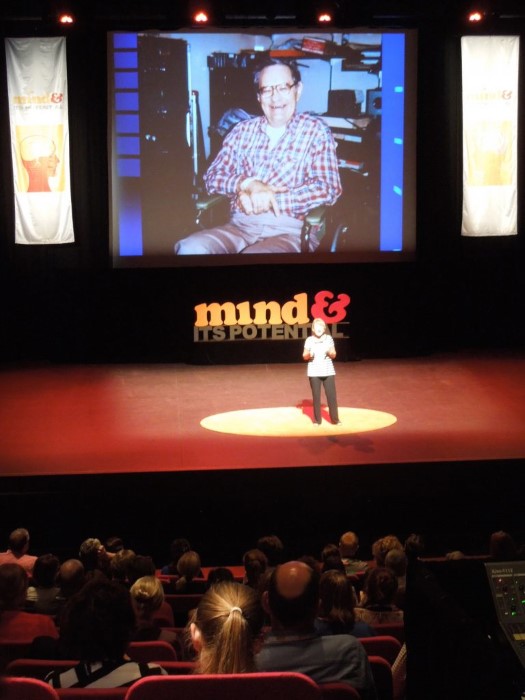
Speaking at Mind & Its Potential Conference (with HM on-screen), 2014
What resources do you recommend for aspiring novelists?
I find Scrivener the best program for writing. It takes a while to get the hang of it, but it is worth it. It would be especially good for self-publishing; with a click, you can convert to a Word doc, pdf, or any e-book file with linked content pages, etc. (One hint: if you are making any changes/revisions, however small, make them on the Scrivener file and not on the Word.doc file and then re-convert to a new Word doc. Otherwise, all sorts of confusion can result later!)
I recommend these books on writing:
For the big picture, motivation, and inspiration:
Stephen King’s On Writing: A Memoir of the Craft
Anne Lamott’s Bird by Bird: Some Instructions on Writing and Life
Betsy Lerner’s The Forest for the Trees: An Editor’s Advice to Writers
For the craft:
All of Donald Maass’s books from Writing the Breakout Novel to Writing 21st Century Fiction: High Impact Techniques for Exceptional Storytelling
Janet Burroway’s Writing Fiction: A Guide to Narrative Craft
Anne Tittenberg and Laura Whitcomb’s Your First Novel: An Author Agent Team Share the Keys to Achieving Your Dream
For a great writer autobiography:
Elizabeth George’s Write Away: One Novelist’s Approach to Fiction and the Writing Life
I subscribe to many writers’ magazines in the US and UK (most have both print and digital editions). Although I often feel I have read much of the craft advice before (many times!) I still love to read them—I think because they consolidate my identity as a real writer. They also include up-to-date information on writing competitions you might enter, conferences and websites.
If you are self-publishing, Joanna Penn’s website The Creative Penn is very helpful.
Join the She Writes community. It has more than 27,000 members, all women writers. She Writes Press (SWP) is a highly respected partnership press that is associated with She Writes, but separate from it. It selects the manuscripts it publishes and follows a traditional publishing and distribution model.
My favorite novels:
Crossing to Safety by Wallace Stegner
In This House of Brede and China Court
by Rumer Godden
Wuthering Heights by Emily Bronte
My favorite authors:
Anything by Sebastian Faulks, many of the books written by Elizabeth Howard, Anna Quindlen, Sue Miller, Lionel Shriver, Ian McEwan, Chris Cleave, Nicholas Evans, Kate Atkinson, Sebastian Barry, Richard North Patterson, and numerous others.
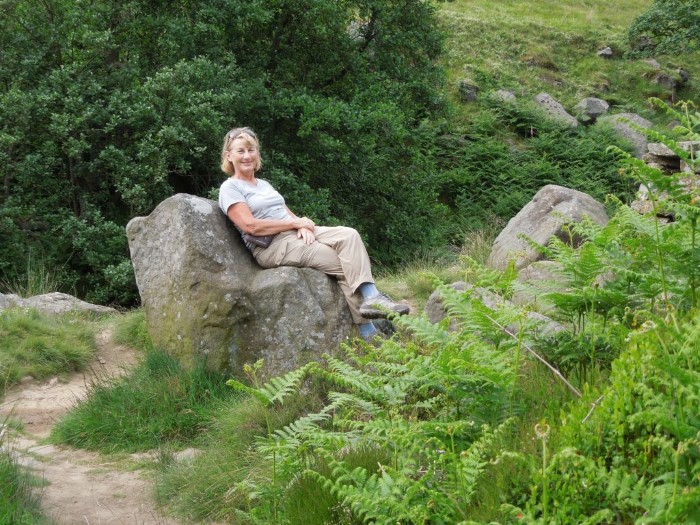
On “Bronte chair” near Haworth, Yorkshire, 2014
Is there anything else you’d like to add?
I also read fiction constantly and try to review most of the books I read on Goodreads as I know how important reviews are for authors. I rarely put up a review of less than three stars though unless the author is very well known and has hundreds of reviews, so mine will not make a difference to the overall star rating, and I really don’t like the book.
I have even become a Netgalley reviewer, another bonus of publishing with SWP, as that is where I discovered NetGalley and got lots of great advance reviews for A Drop in the Ocean. Now I sometimes get to read and review my favorite authors’ new books before they are out in hard copy (which I can’t afford, especially as postage to New Zealand doubles their cost).
Please support struggling authors to encourage them to keep writing books for you to read. Buy or borrow the book, read it, and PLEASE review it on Amazon, Goodreads, or wherever you can, especially if you like it! Don’t be shy, even a couple of sentences about your favorite character or the writing style is enough. Even just a rating is better than nothing. If you don’t know what to say, read a few other reviews that have given it a similar rating, and see if something those reviewers say clicks with you. Then use it or something similar in your review!
Spread the word. Tell your bookish friends, suggest it to your book club, post your review on your social media, and buy a copy for someone you think will love it! And subscribe to the author’s e-mail list/website/newsletter.
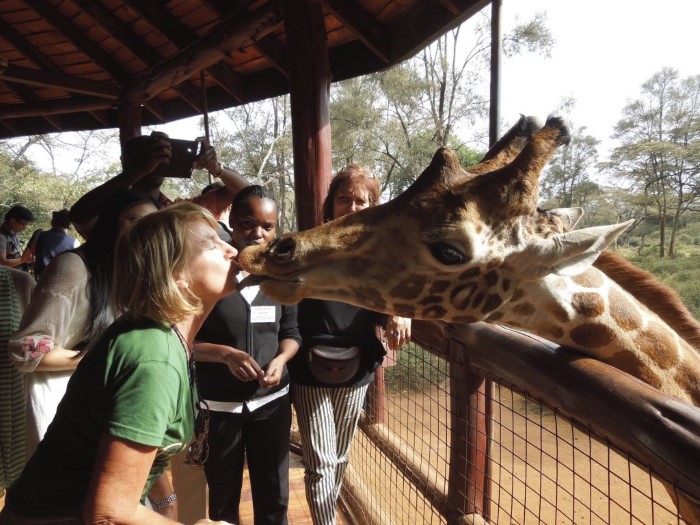
Kissing a giraffe, Kenya, 2014
Contact Jenni Ogden at jenniogdenauthor@gmail.com
Please subscribe to my monthly e-newsletter
Visit my author website
Visit my Psychology Today blog
Like my author Facebook page
Follow me on Facebook
Connect on LinkedIn
Follow me on Twitter
Friend me on Goodreads
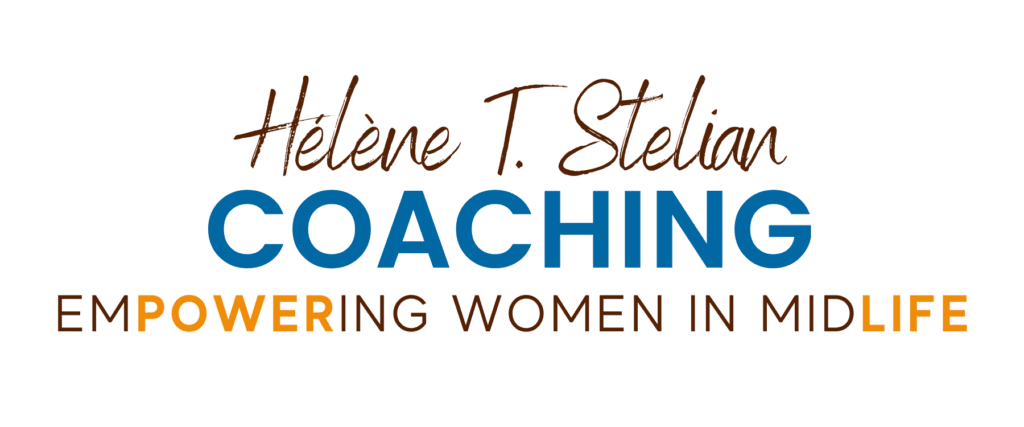
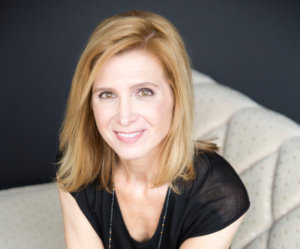
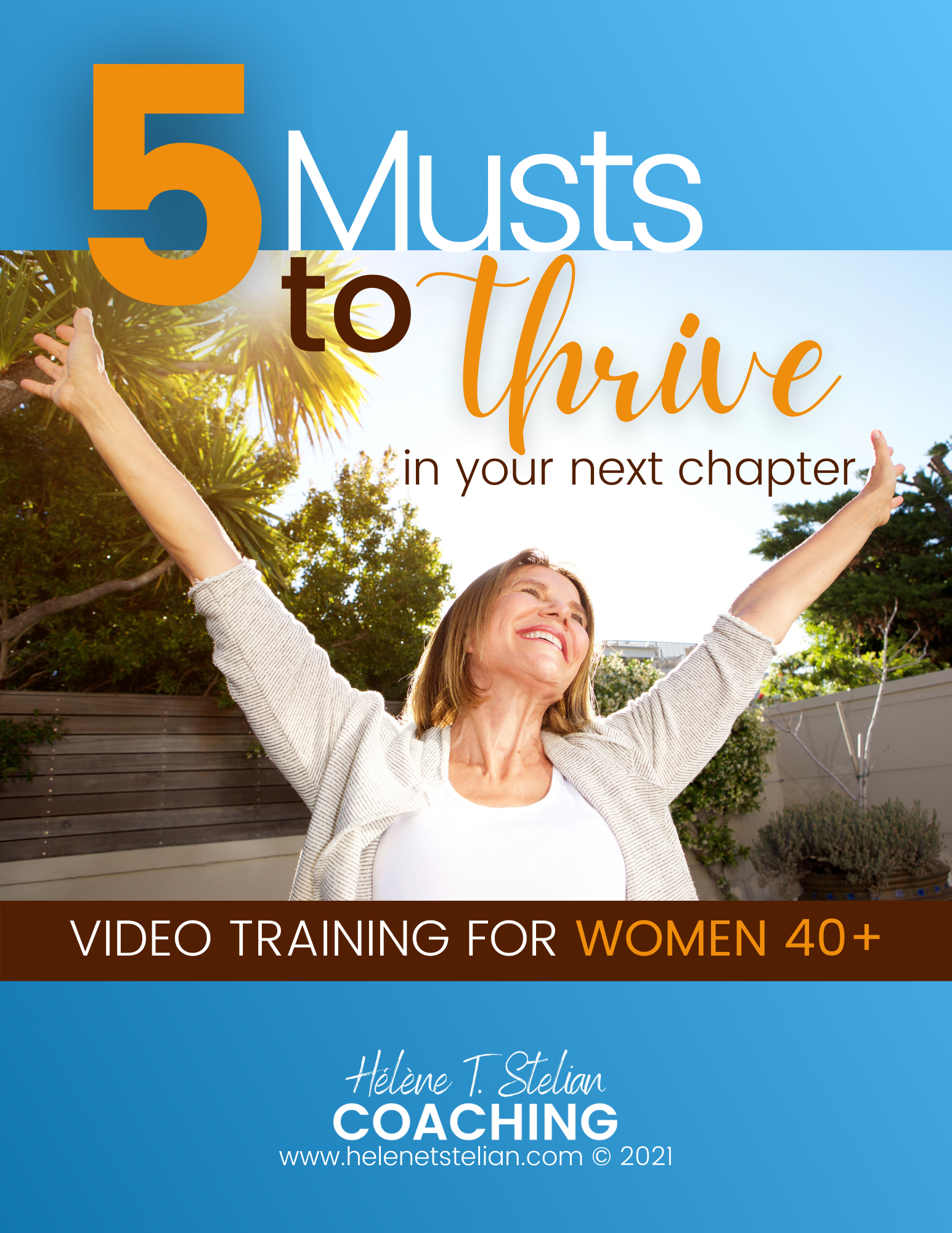



Every piece of this is amazing. And I want to move to the island. Maybe that will be my next act!
Right there with you! Thanks for reading Anna!
Kia ora Anna, Lovely name you have; same as the protagonist in ‘A Drop in the Ocean’. Look forward to seeing you on our island,
best,
Jenni
Out of the park! (Sorry for the tired baseball metaphor, but you really did.) I love these stories of re-invention. They are so inspiring and women like this are my literary heroes. Jenni’s story is nothing short of amazing. Tackling fiction at any age is a daunting endeavor, but doing it with such verve and style in retirement is a rare and beautiful thing. I just put “A Drop In The Ocean” on my kindle and I WILL be posting a review asap!
Amazing story, I agree! Thanks so much for reading Corie!
Thanks Corie and for the e-mail which I have replied to directly! I love your websites and cannot wait to read your novels and see the movie of Orfan! Wimmin are doin’ it everywhere!!
Best,
Jenni
Thank you so much Helene for this great interview! My husband says it will be especially useful when he needs to come up with an obituary for me! It is good to be reminded of the great life I’ve had so far; lots more to come.
Best,
Jenni
तीनो विजेताओं को बधाई अप्पका ये प्रयास बहुत सराहनीय है आपको à¤ी बधाई ।
There's an interesting piece on this question in the NYT . The gist of it is that no-one can or will say whether derivatives contracts worsen the problem a whole bunch. That's adding a cloud of uncertainty.
TonyF: your taxes contribute to the roof over my head and food on the table for which I am very grateful. It does seem very stupid, but I'm not alone in this situation – apparently the cost of supplying power wheelchairs to all people in my position would be prohibitive. Rationing happens everywhere, this just seems a particularly foolish way to go about it. BG
Thank you Jenni
I have read your story, I heard something before for your family but this one incompose a very comprehensive picture of your life. You are a lovely mum, wonderful wife, thoughtful supervisor and also a great writer! I was lucky to choose John as my supervisor and even more lucky to know you Jenni!
Happy Mother’s day!
Thank you Yanbin!
Best,
Jenni
I loved the new book – only took a few days to read it. Interesting too as I know of a family with HD. How I would love to live on an island in the GBR, that is where I should have been born. The scenery, the swimming, the climate, the casual life style. Happy long life to you.
Thank you Aylene,
Happy you enjoyed the book, and hope to see you on Great Barrier Island, NZ some day!
Best,
Jenni
PS Love you to put a review on Amazon, Goodreads or anywhere you review books, and even perhaps sign up for my monthy e-newsletter!!
Great interview and insights from dr. Ogden. I think I encountered a passage from her Fractured Minds once, and I liked it a lot